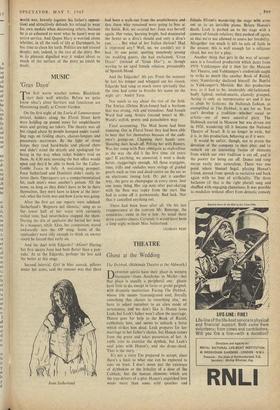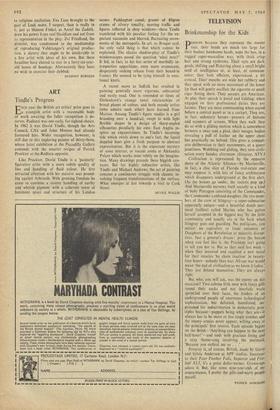THEATRE Ghost at the Wedding
The Dybhuk. (Habimah Theatre at the Aldwych.)
DEPARTED spirits have their place in western literature—from Aeschylus to Mailer—but that place is usually a peripheral one: ghosts have little to do, except in farce or grand guignol, with dramatic motivation. Facing The Dybbuk, whose title means `transmigrated soul, literally something that cleaves to something else,' we have to adjust ourselves to an alien mode of seriousness, and we don't like it. Hanan loves Leah, but Leah's father won't allow the marriage; Hanan goes for help to the Book of Raziel, cabbalistic lore, and seems to unleash a force which strikes him dead. Leah prepares for her marriage to her father's choice, but Hanan comes from the grave and takes possession of her. A rabbi tries to exorcise the dybbuk, but Leah's soul joins with Hanan's, and she drops dead. That is the story.
It's not a story I'm prepared to accept, since there's a limit to what one can be expected to take on trust. I don't mean just the existence of dybbukim or the lethality of a dose of the Cabbala, but the human elements which are the true drivers of a plot. Hanan's anguished love needs more than some wild speeches and Jehuda Efroni's wandering the stage with arms out as to an invisible piano. Before Hanan's death, Leah is pushed on to the stage with a convoy of female relatives, then pushed off again, so that we're not allowed to assess her lovability. Altogether too much is left to• acts of faith in the unseen; this is well enough for a religious ritual, but not for a play.
Another thing that gets in the way of accept- ance is a fossilised production which dates from 1919, Vahktangov did it then for the Moscow Art Theatre, and Vahktangov's credentials ought to strike us dumb like another Book of Raziel, since Stanislaysky declared himself the Baptist to Vahktangov's Messiah. But this production was, as it had to be, intolerably old-fashioned, badly lighted, melodramatic, clumsily grouped. Acting is only an interpretative art and it has to abide by fashions; the Habimah fashion, as exemplified in The Dybbuk, is not for us. You can't develop a tradition—whether social or artistic—out • of mere ancestral piety. The Habimah started in Moscow but was driven out in 1926, wandering till it became the National Theatre of Israel. It is no longer in exile, but it is, in this production, behaving as if it were.
It would be unfair, though, not to praise the devotion of the company to their play, and to remark on an interesting fusion of elements from which our own tradition is cut off, and is the poorer for being cut off. Dance and song merge easily into naturalism. There was one point whore Shmuel Segal, playing Hanan's friend, moved from speech to recitative and back again with no hint of artificiality. The three batlanim (if that is the right plural) sang and shuffled with engaging clumsiness. It was possible to modulate without effort from demotic comedy
to religious exaltation. Eva Lion brought to the part of Leah more, I suspect, than is really in it, just as Shimon Finkel, as Azriel the Zaddik, drew his power from real Hasidism and not from it's representation in the play. Zvi Friedland, the director, was condemned to the mediumship of reproducing Vahktangov's original produc- tion, a slavery that ought to be intolerable to a live artist with ideas of his own. But these Israelites have elected to stay in a forty-six-year- old house of bondage. Alternatively they have no wish to exorcise their dybbuk.
ANTHONY BURGESS



































 Previous page
Previous page